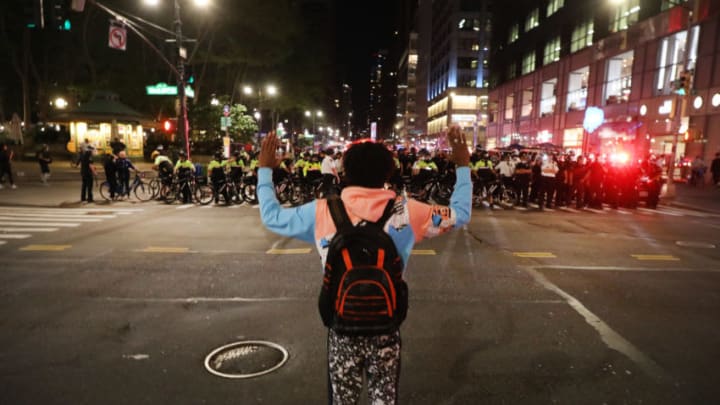The Whiteboard: What can the NBA offer this moment?
By Ian Levy

The Whiteboard is The Step Back’s daily basketball newsletter, covering the NBA, WNBA and more. Subscribe here to get it delivered to you via email each morning.
On Friday, as protests over police violence and the killing of George Floyd continued to ramp up, we used this space to point out that those issues were not separate or abstract from the day-to-day lives of NBA players who were speaking out about them.
Most NBA players have salaries in the millions of dollars but over the past few years, they have been assaulted by police. They have suffered racist abuse at their homes and at their places of work. They have been racially profiled by police and private citizens, suffered illegal searches and repeated humiliations. And for every incident that is blown out into a full news story, there are surely countless others that are suffered in silence, just another indignity piled onto a mountain of micro- and macro-aggressions.
As protests intensified over the weekend, NBA players were present. Jaylen Brown helped organize protestors. Enes Kanter was seen with protestors in Boston. Karl-Anthony Towns took time away from grieving the death of his mother from COVID-19 to stand behind Stephen Jackson, a close friend of Floyd, at a press conference in Minneapolis.
The NBA, as a league, has been vocal about their stance, now and in the past. Teams and owners have made statements of support for racial justice, offered condolences and sympathies for the family of George Floyd. Even Michael Jordan has publicly expressed his outrage.
I won’t pretend to know where things go from here but I feel fairly confident in pointing out that what the league has done to this point isn’t going to contribute much to meaningful change, at least not of the rapid sort the moment demands. The NBA deserves credit for being on the socially progressive end of the spectrum for enormous capitalist structures. But not too much credit. Not when it is so easily distracted by the implications of a financial model that requires mass appeal and can only tolerate so much controversy.
The NBA is going to be working intently this week on finalizing plans for the return of basketball. Which is fine and good. That’s what the organization is for, that’s the challenge they’re built to solve. They are a sports league, an implicit not explicit agent of social change. But meaningful change in this moment is going to require more from every cultural organization, every platform, every structure and every one of us.
I can do more. You can do more. The NBA can do more.
SUBSCRIBE. Get The Whiteboard delivered daily to your email inbox. light
#OtherContent (ICYMI on Friday):
Read The Athletic’s Marcus Thompson, on why we can’t look away.
Read The Nation’s Dave Zirin, on the role of athletes in fighting white blindness.
Read The Undefeated’s Marc J. Spears on what it’s like to be a black basketball player in Boston.
Read Kyle Korver, at The Player’s Tribune, thinking through his white privilege, and then discussing it with teammates Thabo Sefolosha, Georges Niang and Ekpe Udoh.